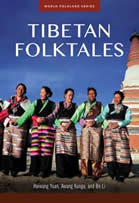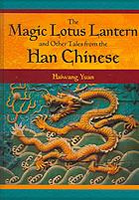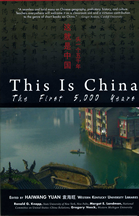A
fire set to a city gate kills the fish in the moat down
below.
(Chinese original: 城门失火,殃及池鱼; Chinese Pinyin:  Chéngmén
shī huó, yāng jí chíyú.) Chéngmén
shī huó, yāng jí chíyú.) |
An unscrupulous destruction may cause a lot of collateral damages or a war or man-made disaster in one country may cause damage to a neighboring country. |
To
sink a fish and down a goose. or To shut
out the moon and put the flowers to shame.
(Chinese original: 沉鱼落雁 or 闭月羞花; Chinese Pinyin:  Chén-yú-luò-yàn or Chén-yú-luò-yàn or  Bì-yuè-xiū-huā.) Bì-yuè-xiū-huā.) |
These metaphors have been used to describe the beauty of a woman. |
A
new-born calf fears no tigers.
(Chinese original: 初生之犊不怕虎; Chinese Pinyin:  Chū
shēng zhī dú bù pà hǔ.) Chū
shēng zhī dú bù pà hǔ.) |
You may use this proverb to describe a new hire who fears no new technologies. |
Flies
never infest an egg without cracks.
(Chinese original: 苍蝇不叮无缝蛋; Chinese Pinyin:  Cāngyíng
bù dīng wú fèng dàn.) Cāngyíng
bù dīng wú fèng dàn.)
|
Cracked
eggs that yield odors are as vulnerable to flies as problem children
to gangs or bad company. |
Hidden
dragons, crouching tigers.
(Chinese original: 藏龙卧虎; Chinese Pinyin:  Cáng-lóng-wò-hǔ.) Cáng-lóng-wò-hǔ.) |
When
you say some place has "hidden dragons and crouching tigers" you mean
that that place has able people who are kept willingly or unwillingly
in a low profile. The proverb is usually used to advise people not to
take a place like that lightly. |
A
minimal error at the start leads to a wide divergence in
the distance.
(Chinese original:差之毫厘,失之千里; Chinese Pinyin:  Chà
zhī háo lí, miù yǐ qiān lǐ.) Chà
zhī háo lí, miù yǐ qiān lǐ.) |
As in
the launch of a rocket, a small error can lead to a serious result. |
One
who walks along a river frequently cannot avoid getting
his shoes wet.
(Chinese original: 常在河边走,哪能不湿鞋; Chinese Pinyin:  Cháng zài hébiān zǒu, nǎ néng bù shī xié.) Cháng zài hébiān zǒu, nǎ néng bù shī xié.) |
It
happens. |
Drinking
the water of a well, one should never forget who dig it.
(Chinese original: 吃水不忘掘井人; Chinese Pinyin:  Chī
shuǐ bù wàng juē jǐng rén.) Chī
shuǐ bù wàng juē jǐng rén.) |
One should
always be grateful to those who helped him succeed. |
A
fall into a ditch, a gain in your wit.
(Chinese original: 吃一堑,长一智; Chinese Pinyin:  Chī
yī qiàn zhǎng yī zhì.) Chī
yī qiàn zhǎng yī zhì.) |
People
learn from their mistakes. |
A
feet can be shorter while an inch can be longer.
(Chinese original: 尺短寸长;
Chinese Pinyin:  Chǐ-duǎn-cùn-cháng.) Chǐ-duǎn-cùn-cháng.) |
Compared
with something longer, a feet may be shorter; compared with something
shorter, an inch seems longer. Things are relative: everything has its
merits and demerits. |
Notoriety
travels farther away.
(Chinese original: 臭名远扬; Chinese Pinyin:  Chòu-míng-yuǎn-yáng.) Chòu-míng-yuǎn-yáng.) |
|
Riddance
of evil must be thorough.
(Chinese original: 除恶务尽;
Chinese Pinyin:  Chú-è-wù-jìn.) Chú-è-wù-jìn.) |
|
If
the lips are gone, the teeth will grow cold.
(Chinese original: 唇亡齿寒; Chinese Pinyin:  Chún-wáng-chǐ-hán.) Chún-wáng-chǐ-hán.) |
Two
parties share a common interest. If one is hurt, the other will, too. |
There
is no silver here: three hundred taels.
(Chinese original: 此地无银三百两;
Chinese Pinyin:  Cǐ dì wú yín sān bǎi liǎng.) Cǐ dì wú yín sān bǎi liǎng.) |
This proverb is to tease those who say or do things blatantly self contradictory and consequently become an object of ridicule.
Read the story in my book The Magic Lotus Lantern and Other Tales from the Han Chinese. |
Thick
branches and big leaves.
(Chinese original: 粗枝大叶;
Chinese Pinyin:  Cū-zhī-dà-yè.) Cū-zhī-dà-yè.) |
To say
is "Thick branches and big leaves" is to accuse him of being
careless, failing to attend to details. |





